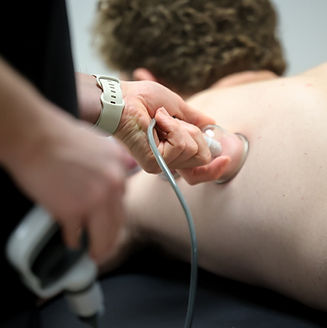
Modalities
01
Dry Needling
Dry Needling involves inserting very thin needles into trigger points in muscles to alleviate pain and improve overall function. It's used for various musculoskeletal issues, such as relieving muscle tension, reducing pain, and enhancing range of motion.
Benefits may include: - improved flexibility - enhance muscle activation and range of motion - improve blood flow - relieve muscle tightness - relief from chronic pain conditions. - trigger point release

Dry Needling can be used on any type of patient from post-operative to a healthy athlete wanting to alleviate muscle tension.
Common situations to use Dry Needling include: - chronic or acute muscle pain - for trigger point release - postural or overuse strain - to improve mobility - injuries such as tendonitis, sports injuries, muscle strains, scar tissue adhesion - chronic or acute headaches
02

Myofascial Cupping
Myofascial Cupping is a technique used to address myofascial restrictions and promote healing by creating an increased vascularity (blood flow) to the area involved.
Benefits may include: - increased blood circulation - improved flexibility - reduced muscle soreness - enhance recovery - improve range of motion These techniques aim to break up fascial adhesions, enhance tissue mobility, and accelerate the healing process.
Myofascial Cupping can be used on: - athletes, both injured and healthy - people with chronic pain - office workers and sedentary individuals - individuals with limited mobility
Common situations to use Myofascial Cupping: - supporting recovery from injury or exercise - to relieve muscle tension, tightness or range of motion - reducing and improving symptoms from scar tissue
03
Blood Flood Restriction Therapy
Blood Flow Restriction (BFR) Therapy involves using a tourniquet to partially restrict blood flow during exercise. It's primarily used in rehabilitation and strength training, aiding in muscle hypertrophy and strength gains with lower loads, making it useful for individuals with injuries or limitations when it's not safe to exercise. BFR Provides the body with more "building blocks" for muscle leading to increased strength and recovery.
Benefits may include: - muscle growth and strength under lower intensity loads - improved endurance - increased cardiovascular benefits - reduced risk of injury
Blood Flow Restriction training can be used on: - athletes in season or coming off of injury - post-surgical rehab - older adults - beginners to strength training - individuals with joint or chronic pain

Common situations to use BFR: - during rehab - prior to or after surgery to prevent muscle loss and improve recovery - athlete or fitness enthusiasts who wants to lift at low intensities but obtain high intensity gains - if you're looking to maximize muscle growth - to avoid injury or overtraining

04
Recovery Electrical Muscle Stimulation
Recovery E-Stim is commonly used in recovery mainly to reduce muscle soreness, enhance circulation, and promote neuromuscular recovery after intense physical activity.
E-stem is often utilized in rehabilitation settings to: - improve muscle function - prevent atrophy, especially after injuries or surgery - stimulate blood flow after injury or muscle breakdown from intense exercise
E-Stim can be used by individuals: - recovery from surgery - athletes, to accelerate recovery - with chronic pain - with some neurological conditions - with poor circulation
Common situations to use E-Stim: - during recovery from injury or surgery - if you're experiencing muscle weakness - after games or intense exercise - if you have some specific neurological disorders - if you have swelling or poor circulation